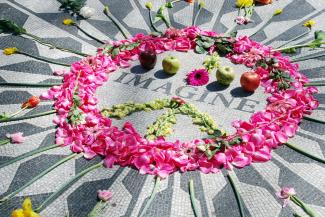
Instructions
Do the preparation exercise before you listen. Then do the other exercises to check your understanding.
Preparation
Do this exercise before you listen.
Transcript
A (Girl 1)
My hero isn’t very famous, but she ought to be. She’s Mary Anning, who was only 12 years old and from a poor family when she made an amazing discovery. She found the first dinosaur skeleton, that of an ichthyosaur, on the cliffs of Lyme Regis in the south of England. That was in 1811, and until then people had thought that it was impossible for an animal to become extinct. Because she was a woman and didn’t have enough money for a proper education, she wasn’t able to take part properly in the scientific community of the time. But she read as much scientific literature as she could and continued to search for fossils, often risking her own life to get them by climbing dangerous cliffs. She once nearly died in a landslide which killed her dog. Although she didn’t write famous books about fossils, her contribution to palaeontology, the study of fossils, is said to be enormous. I admire her because she kept on trying to make new discoveries at a time when usually only men, and men with money, were allowed to be scientists. After her death the writer Charles Dickens said that ‘the carpenter’s daughter has won a name for herself, and has deserved to win it’.
B (Boy 1)
My hero is Kailash Satyarthi, who has been campaigning against child slavery for years. He is from India and first became aware of the problem of children working when he was 6 and noticed that a boy younger than himself had to spend all day polishing shoes and was unable to go to school. When he was 11, he began to collect money to help buy textbooks for other children, and when he was 26 he gave up his job as an electrical engineer to fight child slavery in India, by doing things like raiding factories where children were forced to work, making rugs or glass bottles. He introduced a programme first called RugMark, now known as Goodweave, which puts tags on child-labour-free rugs made in factories. He has saved many thousands of children, over 80,000, from a terrible life of enforced labour in South Asia and helped them to get an education. He has often been physically attacked for helping children, for example for trying to free Nepalese children forced to work in a circus. He regularly risks his life to fight injustice; two of his colleagues have been murdered. I believe that the best thing he has done is to change how people think about child slavery and to make it an international issue.
C (Boy 2)
I’m really interested in ecology and my hero, or heroine, is Rachel Carson because she first got people thinking about the way we humans are causing permanent damage to the Earth’s ecosystems. She began as a biologist, specialising in writing about the sea, but she gradually became aware of the danger of using pesticides like DDT and the way they can harm the whole of the food chain, from the worm to humans! She wrote her classic book Silent Spring in 1962 to explain this to the general public, to explain how humans and nature are interdependent. The title of Silent Spring refers to the fact that one day all the birds might be dead so they won’t be able to sing in the springtime. The agricultural and chemical industries reacted very badly to the book and said she was unprofessional. But further research by other scientists proved that she was right about the dangers of chemicals used to kill insects. Nowadays there is a growing movement for organic food production, but unfortunately things in general are still getting worse, rather than better. We still need to read Rachel Carson’s book and think about its message.
D (Girl 2)
My choice of hero isn’t very original, I’m afraid, but he’s the person I would most like to have met: John Lennon. He died a long time before I was born, and his most famous songs were written long before that, but when I listen to his music I really feel as if he’s speaking to me personally. I love the whole range of the Beatles’ music, from the early pop songs to the very experimental music at the end of their time as a group. John Lennon was the most innovative writer in the Beatles and he continued to create exciting music when he left and went solo. But although I love his music, what I admire about him is his dedication to universal peace. It’s amazing that the song Imagine, written in 1971, is still incredibly popular after all this time. It’s about a world where everyone can be equal, a world with no wars, no divisions between countries, no greed, no hunger, no material possessions ... I’d like to meet him because he was a lifelong rebel, and although he could be a difficult person, he was original, clever and funny. It was awful that he was killed in 1980 when he was only 40. I wonder what he would be doing if he was alive now.
Which of the heroes described in the listening were you most interested in? Why? Do you have a hero of your own? Tell us about them!

Comments